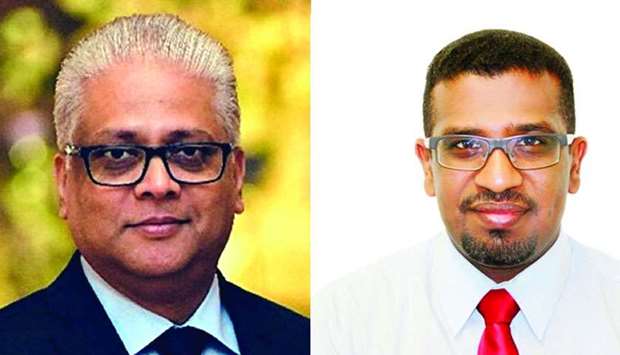A group of researchers from Qatar has had their research about the impact of stroke on the Qatari adult population published in an international scientific journal.
The study, titled ‘Stroke in the Adult Qatari Population: A Hospital-based Retrospective Cohort Study’, was published last month by 'PLOS One', a reputable peer-reviewed open-access scientific journal, Hamad Medical Corporation (HMC) said in a statement Saturday.
Dr Yahia Zakaria Bashier Imam, a consultant with HMC's Neurosciences Institute and a principal investigator of the study, says the research is significant because it is the first of its kind.
“Stroke ranks after only heart disease as the leading cause of death worldwide. Major risk factors for stroke include hypertension, smoking, dyslipidemia, diabetes and obesity. Diabetes and high blood pressure are common among Qatari stroke patients (more than two-thirds of the studied patients were diabetic or had high blood pressure) and might be a contributing factor to the increasing incidence of stroke in Qatar,” said Dr Imam.
“Qatari women, in particular, were found to have an increased risk of recurrent strokes, disability and higher mortality, compared with males. Increased age and risk factors may be contributing factors but this warrants further research,” Dr Imam added.
“This study is significant as it lays the foundation for future research on the incidence of stroke in Qataris. We hope it will act as an impetus for further investigation of this population group and specifically the identification of potentially modifiable risk factors and preventive strategies,” Dr Imam noted.
The study, which included researchers from HMC’s Neuroscience Institute and Medical Research Centre, Weill Cornell Medicine-Qatar and the University of Alberta in Canada, involved a retrospective review of all Qatari adults presenting with stroke at HMC during a five-year period.
“HMC is the sole provider of acute stroke care in Qatar and in recent years our Stroke Service has undergone an enormous transformation. Since 2014, the Stroke Service has twice been accredited by Joint Commission International, endorsing the quality and safety of the care provided to patients,” said Dr Naveed Akhtar, senior consultant neurologist, head of Stroke Service at HMC and a collaborator on the study.
“Hamad General Hospital is fully equipped for acute stroke care with the Stroke Service’s multidisciplinary team able to provide thrombolysis and interventional thrombectomy for patients who meet the criteria. Since the launch of the Neuroscience Institute, the service has cared for more than 12,000 patients, 19% of them being Qatari nationals,” said Dr Akhtar.
“HMC offers stroke patients a very high standard of care. However, epidemiological studies focusing on stroke in Qatar are scarce and there is very limited research on the stroke characteristics in Qataris compared to other populations. We hope our research will pave the way for more study into this important topic,” added Dr Akhtar.
Dr Yahia Zakaria Bashier Imam, a consultant with HMC's Neurosciences Institute and a principal investigator of the study, says the research is significant because it is the first of its kind.
“Stroke ranks after only heart disease as the leading cause of death worldwide. Major risk factors for stroke include hypertension, smoking, dyslipidemia, diabetes and obesity. Diabetes and high blood pressure are common among Qatari stroke patients (more than two-thirds of the studied patients were diabetic or had high blood pressure) and might be a contributing factor to the increasing incidence of stroke in Qatar,” said Dr Imam.
“Qatari women, in particular, were found to have an increased risk of recurrent strokes, disability and higher mortality, compared with males. Increased age and risk factors may be contributing factors but this warrants further research,” Dr Imam added.
“This study is significant as it lays the foundation for future research on the incidence of stroke in Qataris. We hope it will act as an impetus for further investigation of this population group and specifically the identification of potentially modifiable risk factors and preventive strategies,” Dr Imam noted.
The study, which included researchers from HMC’s Neuroscience Institute and Medical Research Centre, Weill Cornell Medicine-Qatar and the University of Alberta in Canada, involved a retrospective review of all Qatari adults presenting with stroke at HMC during a five-year period.
“HMC is the sole provider of acute stroke care in Qatar and in recent years our Stroke Service has undergone an enormous transformation. Since 2014, the Stroke Service has twice been accredited by Joint Commission International, endorsing the quality and safety of the care provided to patients,” said Dr Naveed Akhtar, senior consultant neurologist, head of Stroke Service at HMC and a collaborator on the study.
“Hamad General Hospital is fully equipped for acute stroke care with the Stroke Service’s multidisciplinary team able to provide thrombolysis and interventional thrombectomy for patients who meet the criteria. Since the launch of the Neuroscience Institute, the service has cared for more than 12,000 patients, 19% of them being Qatari nationals,” said Dr Akhtar.
“HMC offers stroke patients a very high standard of care. However, epidemiological studies focusing on stroke in Qatar are scarce and there is very limited research on the stroke characteristics in Qataris compared to other populations. We hope our research will pave the way for more study into this important topic,” added Dr Akhtar.

